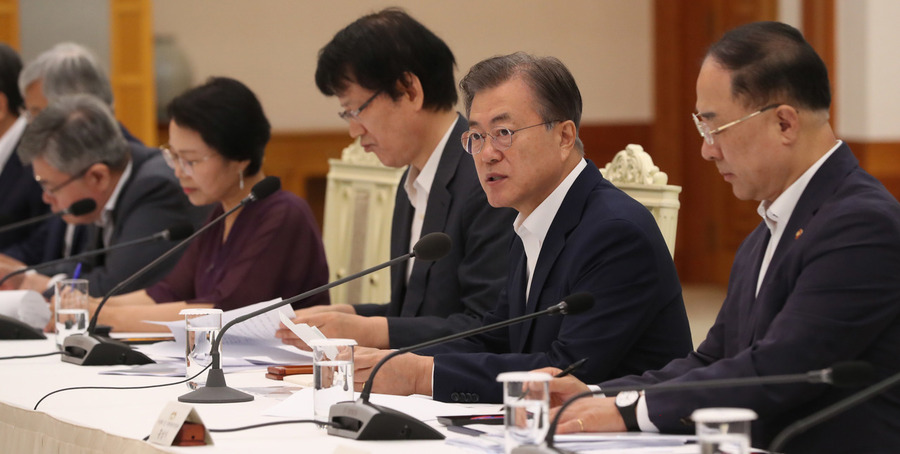 |
|
South Korean President Moon Jae-in speaks on Japan’s export controls during a session of the National Economic Advisory Council at the Blue House on Aug. 8. (Blue House photo pool)
|
S. Korean president calls trade conflict a game with “no winners”
Noting that South Korea is “still faced with uncertainty,” President Moon Jae-in said that Seoul would treat the Japanese government’s export controls “as an opportunity to increase our economic autonomy and to diversify sources of imports on products for which we depend excessively on a single country.” When Japan’s Ministry of Economy, Trade, and Industry removed South Korea from its white list of privileged trade partners the day before, it didn’t extend its export controls beyond the three key materials for the manufacture of semiconductors and displays that had already been restricted. But that’s no reason for South Koreans to let their guard down, Moon suggested. Moon continued his criticism of Japan during the second full session of the National Economic Advisory Council, held at the Blue House on Aug. 8. “Japan is a country that has benefited immensely from the free trade order, as well as a country that has vocally advocated the doctrine of free trade when it deems necessary. That’s why its recent measures are such a contradiction,” the president said. “I’m not sure what Japan stands to gain from its unilateral trade retaliation. Even if it has something to gain, that will be fleeting. In the end, there are no winners in this game: everyone will lose out, including Japan,” Moon said. “Any attempt to weaponize the areas in which some country has an advantage causes harm to the international system of peaceful free trade. Japan will eventually lose the trust of the international community, while Japanese companies will lose business, too.” A number of economists joined Moon on the council, including Joo Sang-young, a professor of macroeconomics at Konkuk University; Cho Dae-yop, a professor of livelihood economics at Korea University; Lee Geun, a professor of innovative economics at Seoul National University; and Song Eui-young, a professor of foreign economics at Sogang University. During the meeting, Lee Jay-min, professor emeritus at Yonsei University and vice chair of the council, argued that Japan’s export controls have the undisclosed goal of keeping South Korea tied to a vertical division of labor. “It’s true that the normalization of diplomatic relations with Japan in 1965 helped South Korea become one of the few countries to have moved from the developing world to the developed world following World War II. The Japanese government set up a vertical division of labor with South Korea at the time and had hoped to maintain that, but, in many areas, South Korea has taken the lead. The current Japanese government, under Abe, is attempting to reverse that unintended result,” Lee said. “Council members offered a diagnosis of the economy as a whole, talking about market diversification in areas such as ASEAN and India, offering a vision for the future, expanding support for SMEs, developing human resources, and providing measured support. They also expressed views about the direction of economic development,” Blue House Spokesperson Ko Min-jung said after the meeting. Conflicting opinions on easing corporate regulations as solution But according to several figures who attended the meeting, “there were conflicting opinions about easing corporate regulations.” “Responding to Japan’s export controls demands research and development, but some people said that the 52-hour work week presents an obstacle. Others said that keeping workers safe from chemicals and achieving income-led growth is necessary if we’re to boost our economic competitiveness in the long term,” said one attendee who spoke with the Hankyoreh on the phone. “Japan might not impose [additional] export controls, and there might not be any actual damage. Nevertheless, it remains true that we’re still faced with uncertainty,” Moon said. By Lee Wan, staff reporter Please direct comments or questions to [english@hani.co.kr]






